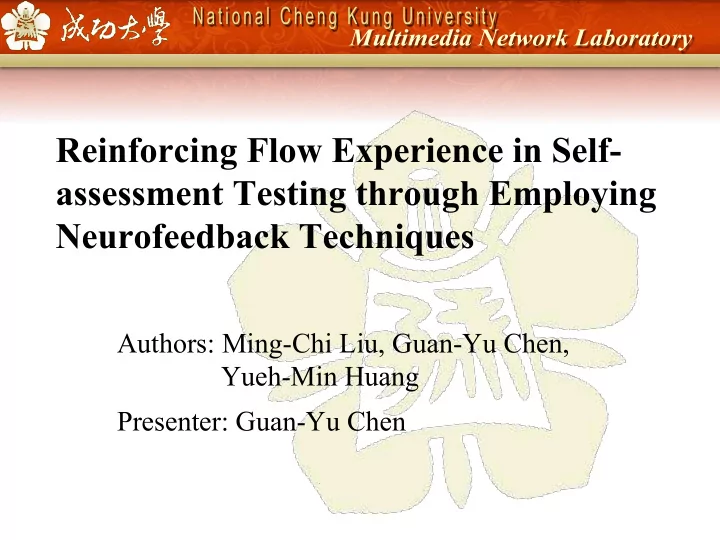

Reinforcing Flow Experience in Self- assessment Testing through Employing Neurofeedback Techniques Authors: Ming-Chi Liu, Guan-Yu Chen, Yueh-Min Huang Presenter: Guan-Yu Chen
Outline 1. Computerized Testing 2. Flow Theory 3. Arousal Theory 4. Stress Theory 5. Instrument 6. Method 7. Experiments 8. Results 2
1. Computerized Testing • Test System: – Item Analysis: Correct Rate, IRT, MIRT – Item Selection: Teacher’s Profession, Algorithms – Ability Evaluation: Efficiency, Accuracy 3
1. Computerized Testing • Computerized Testing – Test Tools • Doing Test, Marking Test Paper, Storing Results – Self-assessment – Adaptive Testing – Online Testing / Assessment • Web-based – System Decoration • Visualization, Message Types, Feedback, Availability, Usability 4
2. Flow Theory • In positive psychology, flow, also known as zone, is the mental state of operation in which a person performing an activity is fully immersed in a feeling of energized focus, full involvement, and enjoyment in the process of the activity. • In essence, flow is characterized by complete absorption in what one does. • Flow is a pleasurable state of high productivity which can occur either during work or play. Csikszentmihalyi, M. (1990). Flow: The Psychology of Optimal Experience. Harper & Row. ISBN 978-0-06-016253-5. Nakamura, J., & Csikszentmihalyi, M. (2009). Flow theory and research. Handbook of positive psychology , 195-206. Oxford University Press. ISBN 978-0-19-803094-2. 5
2. Flow Theory • When a person's ability to perform a task balances the difficulty of the task that they have to do, then they enter the flow state. – When the task is too easy, they become bored. – When the task is too hard, they become anxious. – When it's just right, they experience flow. 6
2. Flow Theory • The hallmark of flow is a feeling of spontaneous joy, even rapture, while performing a task although flow is also described as a deep focus on nothing but the activity – not even oneself or one's emotions (Goleman, 1996). Goleman, D. (1996). Emotional Intelligence: Why It Can Matter More Than IQ. Bloomsbury (p. 91). ISBN 978-0-7475-2830-2. 7
3. Arousal Theory • Yerkes and Dodson (1908) developed an empirical relationship between arousal and performance, which named the Yerkes-Dodson law. • This law indicated that a person’s performance increased with mental arousal, but if the levels of arousal became too high, his/her performance decreased. Yerkes, R. M., & Dodson, J. D. (1908). The relation of strength of stimulus to rapidity of habit-formation. Journal of Comparative Neurology and Psychology, 18, 459-482. doi:10.1002/cne.920180503. 8
3. Arousal Theory Yerkes-Dodson Human Performance Curve 9
4. Stress Theory • Cox and MacKay (1976) redefined the law by emphasizing the psychological phenomenon of the stress. – If a person's stress is too low, he/she may feel boring. – Oppositely, if a person's stress is too high, he/she may break down. • There exists a best performance that can be found under certain ranges of stress levels. When a person is in a state of flow, his/her performance is at the top of the performance curve (Payne, 2005). Cox, T., & Mackay, C. (1976). A psychological model of occupational stress. A paper presented to The Medical Research Council. Mental Health in Industry, London, November. Payne, R. (2005). Relaxation Techniques - A Practical Handbook for the Health Care Professional (3rd ed.). New York: Churchill Livingstone. 10
4. Stress Theory 11
5. Instrument • Neurosky Mindware Mobile – ThinkGear eSense: Attention & Meditation EEG Spectrum: δ , θ , α , β , γ RAW Data: 512 Hz Eye Blink 12 Pictures from: http://neurogadget.com/2012/12/20/neurosky-mindwave-mobile-review/6611
5. Instrument • Advantages – Simple Data: Attention , Meditation … – Easy to Setup: Dry Electrode , Easy to Wear … – Mobility: Bluetooth , Network … – Software Support: Useful , Funny … – Programmable • Shortcomings – Only One Channel – Data & Sample Lose: Electrode Leaves skin – High Power consumptive: AAA Battery ( 5 hrs ) – Uncomfortable: Earlobes Hurt , Too Big Head … 13
6. Method 14
7. Experiments 15
7.1 Test System Screenshot 16
7.2 Experimental Pictures 17
8. Results 15 Testees (Mean Age = 25.0667, SD = 3.01109) Computer Skills & Usages n = 15 Mean SD >= 4 (%) 1. I often use the computer. 4.8667 .35187 100.00 2. I am adept at using computers. 4.4667 .51640 100.00 3. I often use the Internet. 4.9333 .25820 100.00 4. I am adept at using the Internet. 4.8000 .41404 100.00 5. I often use computers for learning. 4.2667 .96115 80.00 6. I am adept at using computers for learning. 3.9333 .88372 73.33 7. I often use the computer test. 3.2000 1.08233 40.00 8. I am adept at using the computer test. 3.3333 .97590 46.67 18
8. Results Mean n SD SEM Attention Easy 53.1333 15 6.30042 1.62676 Attention Difficult 54.0667 15 8.16322 2.10773 Meditation Easy 46.6667 15 9.02114 2.32925 Meditation Difficult 44.0000 15 9.03960 2.33401 Sig. Mean SD SEM LB UB t DF (Two Tails) Attention -.93333 9.23090 2.38341 -6.04524 4.17857 -.392 14 .701 Easy - Difficult Meditation 2.66667 7.11805 1.83787 -1.27518 6.60851 1.451 14 .169 Easy - Difficult 19
The End~
Q & A
Recommend
More recommend